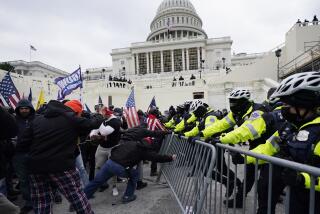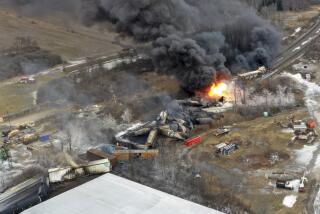Terror Preparation Faulted
Police and fire departments across the U.S. are “dangerously ill-prepared” to respond to terrorist attacks and governments need to spend another $100 billion over five years to improve emergency preparedness, a report says.
Congress and the Bush administration should devise nationwide standards to ensure that local police and firefighters are properly equipped and trained to respond to chemical, biological or radiological weapons attacks, said the report released by the Council of Foreign Relations in Washington.
The study found that local police don’t have protective gear to wear when responding to chemical or biological attacks, and fire departments only have breathing apparatus for half their personnel.
Almost two years after the Sept. 11 attacks on the World Trade Center and the Pentagon, the nation “remains dangerously ill-prepared to handle catastrophic attack on American soil,” the task force headed by former U.S. Sen. Warren Rudman (R-N.H.) and Richard A. Clarke, a former National Security Council official, said.
“If the nation does not take immediate steps to better identify and address the urgent needs of emergency responders, the next terrorist incident could have an even more devastating impact than the 9/11 attacks” that killed more than 3,000 people, the report said.
The study concluded that federal, state and local governments together need to triple spending on emergency preparedness to $98.4 billion over the next five years to implement needed safeguards. It projected that during the period combined spending will range between $53 billion and $103 billion, depending on how local government spending for emergency preparedness is measured.
Gordon Johndroe, a spokesman for the Department of Homeland Security, called the cost estimates “grossly inflated.”
The new department already has distributed about $4 billion to aid state and local governments this year, and another $4 billion is pending in spending bills Congress will act on this year, he said.
“There’s quite a lot of money in the system,” he said. “We’re providing substantially more money than has ever been provided before.”
The study said the extra money is needed to improve search and rescue capabilities, increase the testing capacity of public-health laboratories to track diseases and expand the nation’s 911 emergency-telephone system.
“America’s local emergency responders will always be the first to confront a terrorist incident and will play the central role in managing its immediate consequences,” the report said. “Their efforts in the first minutes and hours following an attack will be critical to saving lives, re-establishing order, and preventing mass panic,” the report said.
Rudman was the co-author of a study before Sept. 11 warning that the U.S. was vulnerable to terrorist attacks.
Clarke served as an anti-terrorism advisor in the White House during the Clinton and first Bush administrations. He left government this year after advising President Bush on Internet security.
Johndroe dismissed council recommendations for a $10 billion upgrade for the 911 emergency system and another recommendation of $3.3 billion for emergency operations centers. Many cities have already installed such equipment.
“I think the council would like to install gold-plated telephones,” he said.
More to Read
Sign up for Essential California
The most important California stories and recommendations in your inbox every morning.
You may occasionally receive promotional content from the Los Angeles Times.










